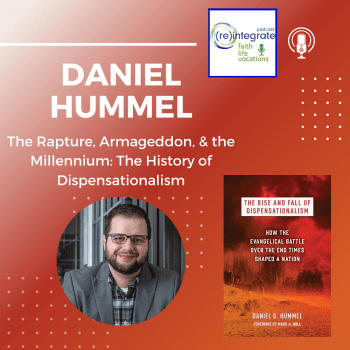 We have been led to believe that the only thing that the shed blood of Christ accomplished is our personal justification.
We have been led to believe that the only thing that the shed blood of Christ accomplished is our personal justification.
Perhaps, like the churches and seminary I attended, the focus of your church was very much on the Book of Romans.
I had come to the conclusion that all I need to know about the shed blood of Christ on the cross is found in Romans. Romans is, after all, the primary document of the New Testament, spelling out what is really important.
The Book of Romans is clear that…
- All have sinned and fall short of the glory of God (Romans 3:23),
- And the wages of sin is death (Romans 6:23),
- But God demonstrates His love toward me, in that while I was still a sinner, Christ died for me (Romans 5:8),
- I can be justified freely by God’s grace through the redemption that came by Christ’s sacrifice of atonement, which was done through shedding his blood on my behalf on the cross. (Romans 3:24-35),
- Therefore, if I declare with my mouth, “Jesus is Lord,” and believe in my heart that God raised him from the dead, I will be saved – because it is with your heart that you believe and are justified, and it is with your mouth that you profess your faith and are saved (Romans 10:9-10). The promise is that if I call on the name of the Lord I will be saved (Romans 10:13).
Now, I don’t even want to come near the impression that I deny those 5 propositions. They are indeed from the Bible.
(But did you even notice how I shifted the focus of the shed blood of Christ toward “me?” We have really made the gospel an individualistic, almost selfish, thing. Me, Me, Me. I, I, I. You probably noticed it. But I wonder how many didn’t?)
The Blood Accomplished a Whole Lot More
What if, instead of starting with the important Book of Romans, we started with the important Book of Colossians?
According to the first chapter of Colossians, what is really important is this:
- All things (that is, everything, from heaven to earth, from the visible to the invisible, from every ruler you can name on the planet) were created in, through and for Christ Jesus (Colossians 1:16)
- Jesus is before all things, and in him all things hold together (v. 17)
- Jesus is head of the body, the church (v. 18a)
- Jesus resurrected, therefore guaranteeing that others can be raised from the dead (v. 18b)
- Jesus Christ’s resurrection proves that in everything he has the supremacy (v. 18c)
- God was pleased to have all his fullness dwell in Jesus (v. 19)
- And, through Jesus Christ, God is reconciling to himself all things (that is everything we can possibly think of) (v. 20a)
- And the means of reconciling all things to himself is this: By making peace through Jesus Christ’s blood, shed on the cross (v. 20b).
In the words of Al Wolters,
“Grace restores nature, making it whole once more…It is all of creation that is included in the scope of Christ’s redemption: the scope is truly cosmic. Through Christ, God determined ‘to reconcile to himself all things,” writes Paul, and the words he uses (ta panta) preclude any narrow or personalistic understanding of the reconciliation he has in mind… The scope of the redemption is as great as that of the fall; it embraces creation as a whole.” (Albert Wolters, Creation Regained, p. 72).
Easter Accomplished a Whole Lot More
The whole of creation is being remade by the grace and power of God. The story does not end (thankfully) with Jesus dying a bloody death on the cross.
Easter is next!!
Tom Wright makes this astonishing observation:
“John 20 stresses twice (in verses 1 and 19) that Easter is the first day of the new week. John has so ordered his gospel that the sequence of seven signs, climaxing in the cross of Jesus on the sixth day of the week and his resting in the tomb on the seventh, functions as the week of the old creation; and now Easter functions as the beginning of the new creation.” (N. T. Wright, Surprised by Hope, p 238).
For years, the New International Version of the Bible translated 2 Corinthians 5:17 in a very individualistic fashion.
The 1984 version of the NIV read,
“If anyone is in Christ, he is a new creation; the old has gone, the new has come.”
In the latest rendering, the translation committee agreed that the text of this verse is actually saying that when an individual becomes a Christian, it is an indication that something cosmic is happening!.
The 2011 translation reads,
“Therefore, if anyone is in Christ, the new creation has come: The old has gone, the new is here!”
The cross and the resurrection restores all things, starting with human beings (as made clear by the verses above from Romans), to make right what humans have made wrong through our sin. It is a cosmic restoration project. God is reconciling everything back to himself.
What an incredible gospel!
Image by saigerowe. Used with permission. Sourced via Flickr.













